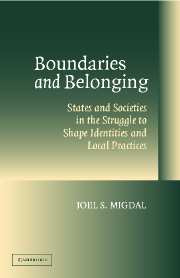 Boundaries and Belonging
Boundaries and Belonging Book contents
- Frontmatter
- Contents
- List of Contributors
- Preface and Acknowledgments
- PART I INTRODUCTION
- PART II ON THE EVE OF THE NATION-STATE: THE OTTOMAN EMPIRE
- PART III THE STATE AND “DANGEROUS POPULATIONS”
- PART IV INSCRIBING MEMBERSHIP AND CONTESTING MEMBERSHIP IN THE NATION
- 7 Challenging Boundaries and Belongings: “Mixed Blood” Allotment Disputes at the Turn of the Twentieth Century
- 8 Belonging and Not: Rossland, British Columbia, during the Great War
- 9 Boundaries and Belonging in Conditions of Extreme Politicization: The Chinese State in Private and Public Spaces, 1949–1968
- 10 Gender and the Reproduction and Maintenance of Group Boundaries: Why the “Secular” State Matters to Religious Authorities in Israel
- PART V BEYOND THE STATE: TRANSNATIONAL FORCES AND THE CHALLENGE TO THE STATE
- PART VI CONCLUSION
- Index
8 - Belonging and Not: Rossland, British Columbia, during the Great War
Published online by Cambridge University Press: 25 July 2009
- Frontmatter
- Contents
- List of Contributors
- Preface and Acknowledgments
- PART I INTRODUCTION
- PART II ON THE EVE OF THE NATION-STATE: THE OTTOMAN EMPIRE
- PART III THE STATE AND “DANGEROUS POPULATIONS”
- PART IV INSCRIBING MEMBERSHIP AND CONTESTING MEMBERSHIP IN THE NATION
- 7 Challenging Boundaries and Belongings: “Mixed Blood” Allotment Disputes at the Turn of the Twentieth Century
- 8 Belonging and Not: Rossland, British Columbia, during the Great War
- 9 Boundaries and Belonging in Conditions of Extreme Politicization: The Chinese State in Private and Public Spaces, 1949–1968
- 10 Gender and the Reproduction and Maintenance of Group Boundaries: Why the “Secular” State Matters to Religious Authorities in Israel
- PART V BEYOND THE STATE: TRANSNATIONAL FORCES AND THE CHALLENGE TO THE STATE
- PART VI CONCLUSION
- Index
Summary
At the present time often purely emotional means are used … to set the masses in motion. One may call the existing state of affairs a “dictatorship resting on the exploitation of mass emotionality.”
Max Weber, Politics as a VocationWeber's statement, made not long after the First World War, reflected the apparent ease with which modern states were able to mobilize society to wage war. According to Weber, the danger, risk, and sacrifice associated with war could easily be accepted by the mass of people through “the fervor of emotional influence.” This emotion is directed toward the state not as a bureaucratic apparatus, but rather as an embodiment of the nation, resting on a “sentiment of solidarity in the face of other groups.” War, in short, activates a strong consciousness and awareness of the nation and its distinctive institutions that somehow deserve to be defended in the strongest possible way.
Yet inasmuch as officials of the state may “want the state to matter most, enough to die for,” as Migdal suggests, the state's achievement of such a goal should not be regarded as a forgone conclusion. When one stops to think about it, the popular internalization of the state as the embodiment of the nation is actually a rather remarkable achievement, resting both on the infrastructural power at the disposal of the state and on the opportunity to forge mass emotional bonds with significant segments of society.
- Type
- Chapter
- Information
- Boundaries and BelongingStates and Societies in the Struggle to Shape Identities and Local Practices, pp. 177 - 204Publisher: Cambridge University PressPrint publication year: 2004
- 2
- Cited by


